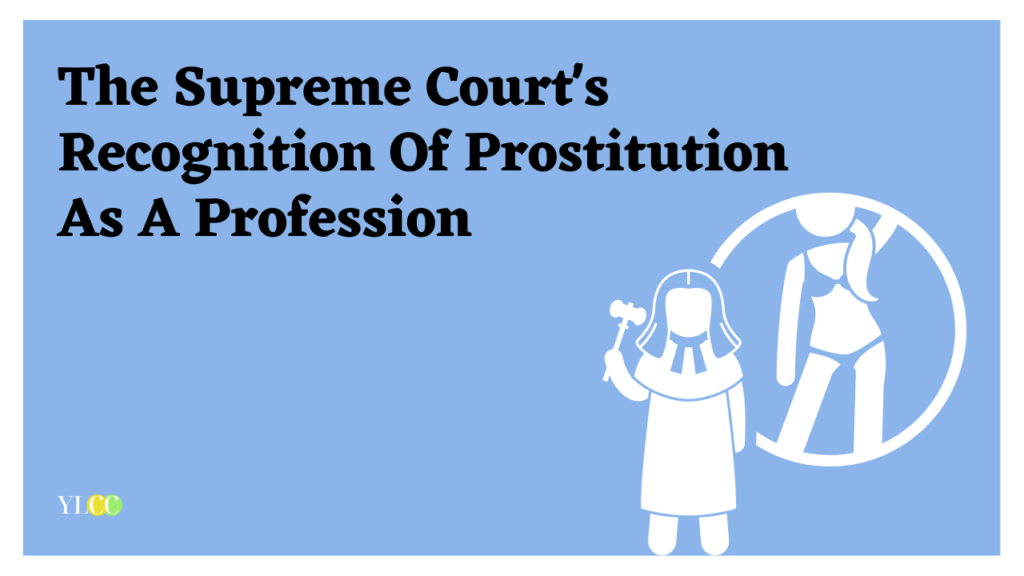
INTRODUCTION
Even when the Constitution guarantees and gives all people in the nation equal rights and powers, it is frequently necessary to reclaim this right with the assistance of judicial intervention and legislation protection because of biases and exploitation on the part of some sections of society. Recently, in the landmark case of Budhadev Karmaskar Vs. The State Of West Bengal & Ors, The Supreme Court of India recognized prostitution as a profession, and ordered police to treat sex workers with dignity while giving six directives protecting the rights of sex workers.
The present case was filed against Budhadev Karmaskar in the form of criminal proceedings for the atrocious murder of a prostitute who had refused to have sex with him. The case was decided by the Calcutta High Court in 2004 when it issued a judgment declaring the appellant guilty of murder. The appellant had appealed the sentence imposed on him to the Supreme Court following the announcement of the verdict of conviction. The Criminal Appeal No. 135 was dismissed in 2010 on the grounds that the SC agreed with the decision made by the Calcutta High Court, and then SC adopted the Suo Motto move of altering the appeal into a Public Interest Litigation.
FACTS
In the year 1999, Budhadev Karmaskar had severely battered the head of a diseased sex worker in the red-light area of Calcutta, upon her refusal to have a sexual intercourse with him. Having her head repeatedly slammed on the floor in a room, the deceased’s injuries led to her brutal death for the pitiful purpose of protecting her sanity and dignity. The appellant was found guilty of assault causing murder as a result of this act. Both the High Court and the Supreme Court upheld the conviction on the grounds that sex workers should not be degraded and should be allowed to engage in prostitution with dignity and free will, rather than being forced into it or having their identities falsified[1].
The Apex Court also took corrective action in this case, by creating a panel to help the current prostitutes who are being forced to perform the act against their will. The panel has recommended that the SC approve an aid package of Rs.10,00,000 from the Central Government, Rs. 5,00,000 from the State Government, and Rs. 2,00,000 from the Union Territories to facilitate the teaching of vocational and technical skills to the sex workers so they to earn their livelihood and for them to get rehabilitated into the society with dignity.
ISSUES
- How can the Right to Live with Dignity be guaranteed to sex workers and their descendants by applying the parameters of Article 21 and its definition of “Life”?
- What will be location for the panel’s accommodations?
- How can the sex workers be rehired, rescued, and rehabbed into a safer environment?
ARGUMENTS ON BEHALF OF PETITIONER:
On behalf of the petitioners, it was asserted that the main challenge they faced when working with the rescued sex trafficking victims was that the managers and sex rackets were made aware of their rescue operation in advance, making them attentive of their visit. In addition, the petitioners claimed that the involvement of peddlers and traffickers led to the girls being forced and coerced into the sex worker industry, mostly by their family members[2]. A successful rescue attempt would be doomed to failure, and it would be even harder to rehabilitate the victims unless the link between the traffickers, brothel owners, and the families of the victims is broken. The petitioners argued that the State Legal Services Authority should assist in setting up a helpline number for NGOs and the State Machineries in order to help the distressed victims of the sex trade who are forced to work in the industry against their will and consent. The petitioners also stated that the panel should only be required to accept funding from states that engage in sexual activity or that have red-light districts with active prostitution there.
ARGUMENTS ON BEHALF OF RESPONDENT :
The counsel representing on behalf of the respondent has claimed that in order for the panel to effectively operate and reinstate the victims of sex trade, the required funds should be placed with the panel as early as possible. The council further argued that the collection of funds was essential in order to conduct workshops and meetings and to enable experts from various fields to engage in disseminating knowledge about vocational and skill-based training not only in metropolitan areas but also in less known areas that are in dire need of help and assistance.
JUDGMENT:
The Supreme Court upheld the legality of the profession of sex work and said that those who engage in it should be treated with respect and have equal protection under the law. It issued commendable directives to protect interests of sex workers[3]. The SC issued the following interim directives to the Union and the States till the legislation on this matter comes into force:
- Sex workers should not be arrested, penalized, harassed, or otherwise victimized when a brothel is raided because performing voluntarily sex acts is not against the law; rather, only operating a brothel is unlawful.
- The police must not discriminate against sex workers when a sex worker files a criminal complaint, especially if the offence is committed against them in a sexual manner. Every facility, including rapid medical and legal care, should be available to sex workers who have been sexually assaulted[4].
- The SC has observed that the police frequently have an aggressive and brutal attitude toward sex workers. The rights of the sex workers are not recognized. The police and other law enforcement organizations should be made aware of the rights of sex workers, who also have access to all of the fundamental human rights and other rights that are granted to all citizens by the Constitution.
- The fact that a mother works in the sex trade should not be used as an excuse to take the child away from her. Sex workers and their children are entitled to basic protection for human decency and dignity. It should not be assumed that a child was trafficked if they are discovered living in a brothel or with sex workers.
- It should be asked that the Press Council of India provide suitable guidelines instructing the media to exercise utmost care not to publish or telecast any images that will reveal the identity of sex workers during arrest, raid, and rescue operations, whether as victims or accused.
- The Union and State Governments should host workshops to inform sex workers of their legal rights regarding sex work, the rights and responsibilities of the police, and what is and is not permitted by the law[5].
- In order to alter the legislation pertaining to sex work, the Union and State governments must consult sex workers or their representatives.
CONCLUSION
For sex workers to be granted the fundamental rights enjoyed by everyone else, it is crucial that the Centre respect the directives given by the supreme court and comply with them. These guidelines represent a step toward de-stigmatizing the profession, and if they are adopted and put into practise, they will assist to improve the situation of an Indian sex worker. This legal support can help advance the safety and rights of the sex workers and should not be disregarded because it is one of the oldest occupations in the world and is unlikely to be outlawed, not to mention that engaging in it is frequently a frantic last resort.
[1] Norzom, T. (2022, May 26). Surpreme Court recognises prostitution as a profession, orders police to treat sex workers with dignity. YourStory. https://yourstory.com/herstory/2022/05/surpreme-court-recognises-prostitution-as-profession
[2] Ghosh, T &Nag,S. (2021). Prostitution in India: A Comparison of Ancient and Present Legal Outlook. IJLMH.4 (5).1579 – 1585.https://doij.org/10.10000/IJLMH.112105
[3] Roy, A. (2018). Prostitution And Its Legalization In India – A Plea Against The Sinful Agenda. International Journal of Socio Legal Research. 4(3). 234-249.
[4] Gupta, S. (2022, July 12). India’s Supreme Court rules to protect sex workers amid the COVID-19 pandemic. OpenGlobalRights.https://www.openglobalrights.org/india-supreme-court-rules-to-protect-sex-workers-amid-covid-pandemic/
[5] Chowdhury, S. (2022, May 25). Police Should Not Abuse Sex Workers, Media Should Not Publish Their Pictures During Raid & Rescue Operations:Supreme Court Issues Directions. Livelaw.https://www.livelaw.in/top-stories/supreme-court-guidelines-sex-workers-article-21-rehabilitation-prevention-of-trafficking-200041
YLCC would like to thank Dipti Tharwani for her valuable insights in this article.






